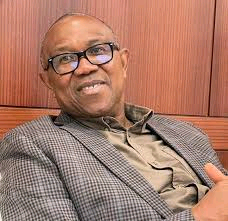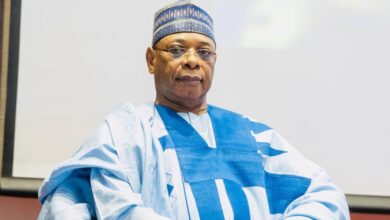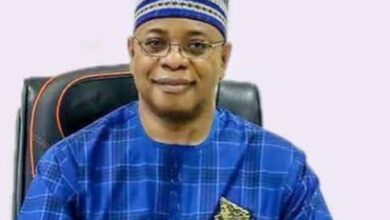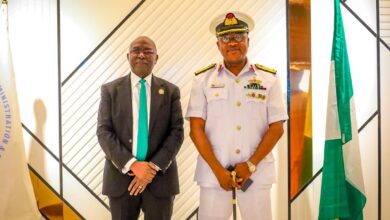Obi Backs $1bn Lagos Port Upgrades, Seeks Similar Investments in Warri, Port Harcourt, Others

The 2023 presidential candidate of the Labour Party (LP), Mr. Peter Obi, has expressed support for the modernisation of the Apapa and Tin Can Island ports in Lagos, following a $1 billion approval by the Federal Government.
ThelensNG reports that the approval was announced by the Minister of Marine and Blue Economy, Mr. Adegboyega Oyetola, at the Chartered Institute of Logistics and Transport (CILT) Nigeria Conference in Lagos on Wednesday.
Reacting to the development on Friday, Obi commended the FG’s efforts to improve efficiency and embrace technology in Nigeria’s maritime sector, noting that such an initiative must be guided by accountability, transparency, and equity for all Nigerians.
“However, this development once again exposes a longstanding concentration of our port development only in Lagos. Nigeria’s infrastructure investment remains excessively concentrated in Lagos, often at the expense of other strategic ports such as Warri, Port Harcourt, Calabar, and Onne. If fully developed, these ports could enhance productivity, drive trade, create jobs, and open new economic corridors that would lift millions out of poverty across the federation.
“Around the world, countries that have decentralised port development are reaping immense economic benefits. Vietnam operates over 300 ports — from Haiphong in the north to Da Nang in the centre and Ho Chi Minh City in the south — ensuring nationwide connectivity. Indonesia boasts about 111 commercial ports distributed across its territory to guarantee balanced access to trade. South Africa maintains eight major seaports — from Durban and Richards Bay on the Indian Ocean to Cape Town and Saldanha Bay on the Atlantic — reflecting a vision of maritime inclusion.
“Egypt runs about 15 commercial ports along both the Mediterranean and the Red Sea coasts; Morocco has about 14 ports open to international trade, including Casablanca, Tangier Med, and Agadir, distributed along its Atlantic and Mediterranean shorelines; and Algeria operates about 10 commercial ports spread across its extensive Mediterranean coast. Even Ghana, with only two major ports — Tema and Takoradi — ensured they are geographically decentralised on opposite ends of its coastline,” he stated.
According to Obi, these nations have grasped a simple truth — that no country seeking to maximise its blue economy concentrates all maritime activities in a single city.
He explained that decentralisation reduces congestion, improves logistics, enhances national security, and promotes balanced economic growth. “In Nigeria, however, more than 70 per cent of port activities are still concentrated in Lagos, burdening the city with chronic congestion, high demurrage costs, environmental degradation, and delays that discourage investors and inflate the cost of goods nationwide.”
Obi noted that developing other ports is not merely an infrastructural necessity but a national imperative, stressing that revitalising Warri, Port Harcourt, Calabar, and Onne ports would decongest Lagos, reduce shipping costs, attract investment, create employment, and stimulate regional economies.
“As one who understands the critical link between infrastructure, trade, and national growth, I believe that a truly national blue economy must carry every region along,” he said, adding that beyond physical infrastructure, reform must also address corruption, reduce bureaucracy, and embrace technology to create a seamless, paperless port system that enhances turnaround time and global competitiveness.
The former Anambra State governor emphasised that, if prudently managed, the Lagos modernisation project could become a model for broader maritime transformation — a reference point from which similar development radiates across the nation.
He further stated that, now more than ever, Nigeria must rebuild with fairness, guided by equity, integrity, and a clear vision to transform the country from one of consumption to one of production and shared prosperity.






**pineal xt**
pinealxt is a revolutionary supplement that promotes proper pineal gland function and energy levels to support healthy body function.
**energeia**
energeia is the first and only recipe that targets the root cause of stubborn belly fat and Deadly visceral fat.
**boostaro**
boostaro is a specially crafted dietary supplement for men who want to elevate their overall health and vitality.
**prostabliss**
prostabliss is a carefully developed dietary formula aimed at nurturing prostate vitality and improving urinary comfort.
**potentstream**
potentstream is engineered to promote prostate well-being by counteracting the residue that can build up from hard-water minerals within the urinary tract.
**breathe**
breathe is a plant-powered tincture crafted to promote lung performance and enhance your breathing quality.
**hepatoburn**
hepatoburn is a premium nutritional formula designed to enhance liver function, boost metabolism, and support natural fat breakdown.
**hepato burn**
hepato burn is a potent, plant-based formula created to promote optimal liver performance and naturally stimulate fat-burning mechanisms.
**cellufend**
cellufend is a natural supplement developed to support balanced blood sugar levels through a blend of botanical extracts and essential nutrients.
**prodentim**
prodentim is a forward-thinking oral wellness blend crafted to nurture and maintain a balanced mouth microbiome.
**neurogenica**
neurogenica is a dietary supplement formulated to support nerve health and ease discomfort associated with neuropathy.
**flow force max**
flow force max delivers a forward-thinking, plant-focused way to support prostate health—while also helping maintain everyday energy, libido, and overall vitality.
**revitag**
revitag is a daily skin-support formula created to promote a healthy complexion and visibly diminish the appearance of skin tags.
**sleeplean**
sleeplean is a US-trusted, naturally focused nighttime support formula that helps your body burn fat while you rest.
**memorylift**
memorylift is an innovative dietary formula designed to naturally nurture brain wellness and sharpen cognitive performance.